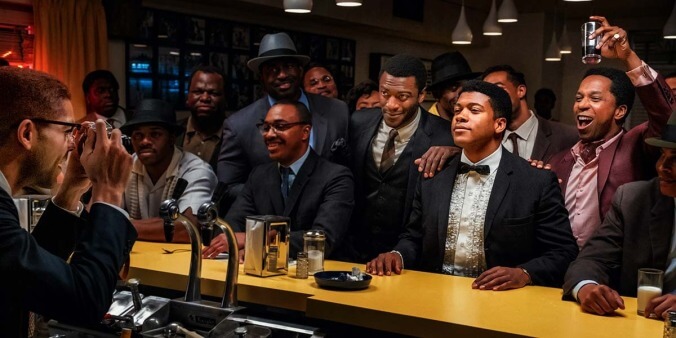This is my first TIFF, so I don’t have any memories of the festival—sentimental or possibly masochistic (based on how many of Dowd’s involve being bent over a laptop at a fast-food joint)—to be wistful about. But covering TIFF has been a goal of mine since before I joined The A.V. Club, so it’s an honor to be part of the press corps shuffling from medium-sized TV screen to smaller laptop screen to bed and back around again for the next week. Out of gluttony, passion, or a fear of missing out (or maybe some combination of the three), a critic might be inspired to try to devour every film at TIFF. But there are only 24 hours in a day.
TIFF does not help this conundrum by making titles accessible only for 48 hours at a time on its digital cinema platform (if you miss it, you missed it), but it does offer some guidance by sorting films into sometimes vague programs. One category that would denote a red-carpet premiere under happier circumstances is a “Gala” screening, like David Byrne’s American Utopia or my first film of the festival, One Night In Miami… (Grade: B).
As Dowd noted in his review of the former, Spike Lee has managed to have a big year despite it all. Likewise Regina King, though her big year started last October, with the premiere of HBO’s Watchmen, which reinvented the superhero genre through the lens of Black history. And it now culminates with One Night In Miami…, her first feature as a director, which has a similar historical angle, dramatizing as it does a true story: the evening Malcom X (Kingsley Ben-Adir), Sam Cooke (Leslie Odom Jr.), Jim Brown (Aldis Hodge), and Cassius Clay (Eli Goree) spent hanging out together in Miami, circa February of 1964, shortly before Clay changed his name to Muhammad Ali.
Based on a play by Star Trek: Discovery staff writer Kemp Powers, who adapted the story for the screen, One Night In Miami… mostly takes place in a single location: a segregated Hampton House motor lodge. King adds subtle touches (she’s especially fond of pulling focus) that keep the film from going visually flat, as does the assiduous period detail. But as one might expect from a movie based on a play and directed by a famous actor, dialogue and performances are the driving force. The casting is remarkable: Everyone looks close but not too close to the famous figures they’re playing, which allows the audience to get caught up in the verisimilitude of the story without being distracted by the eeriness of the resemblance.
The title card doesn’t appear until 19 minutes in, after each of the four main characters appear in a vignette that lays out the underlying tensions they’ll bring to the extended conversation at the center of the film. (For Brown, it’s the cognitive dissonance of racist whites cheering for him on the football field but only on the football field. For Clay, it’s the stubborn need to prove himself.) As a result of this extended prologue, the cast is huge: Most of the supporting roles, like Lance Reddick as X’s bodyguard, Brother Kareem, and Michael Imperioli as Clay’s trainer, Angelo Dundee, have a relatively small amount of screen time. But there are no weak links in King’s ensemble.
That centerpiece discussion eventually gets heated, with at least one of the men storming out of the room rather than listening to another word their (possibly former) friend has to say. But before delving into the sensitive topics of colorism, separatism, and weighing economic self-interest against the good of the community, there’s a breezy segment that gives each of the main players a depth of personality that transcends—and is informed by—their public personas. All four of the leads are great fun to watch, but Ben-Adir is particularly charming as Malcom X, whose legendary militarism is belied by his depiction here as a buttoned-up family man whose suggestion that they stay in and eat ice cream instead of going out and getting drunk gets groans and jeers from his more party-hearty pals.
Through these characterizations, One Night In Miami… offers up a portrait not only of the conflicts and contradictions of the civil rights movement at that exact moment in history but also the nuances of Black masculinity then and now. Certain details are shoehorned in almost by necessity: It lands like a ton of bricks when X remarks, “I’m working on my autobiography,” though the film works the statement in about as naturally as it can. Meanwhile, King emphasizes some biographical details more than others in the epilogue showing how that night affected each of these iconic men. But these expository elements mostly just serve as fuel for the follow-up questions inevitably sparked by this film, which will run the same gamut One Night In Miami… does, from lighthearted (“What historical figures would you like to spend an evening with?”) to weighty (“What is the obligation of an artist to the community that raised them?”). The only problem for those seeing the movie now is the lack of a theater lobby to have these discussions in.

 Keep scrolling for more great stories.
Keep scrolling for more great stories.
